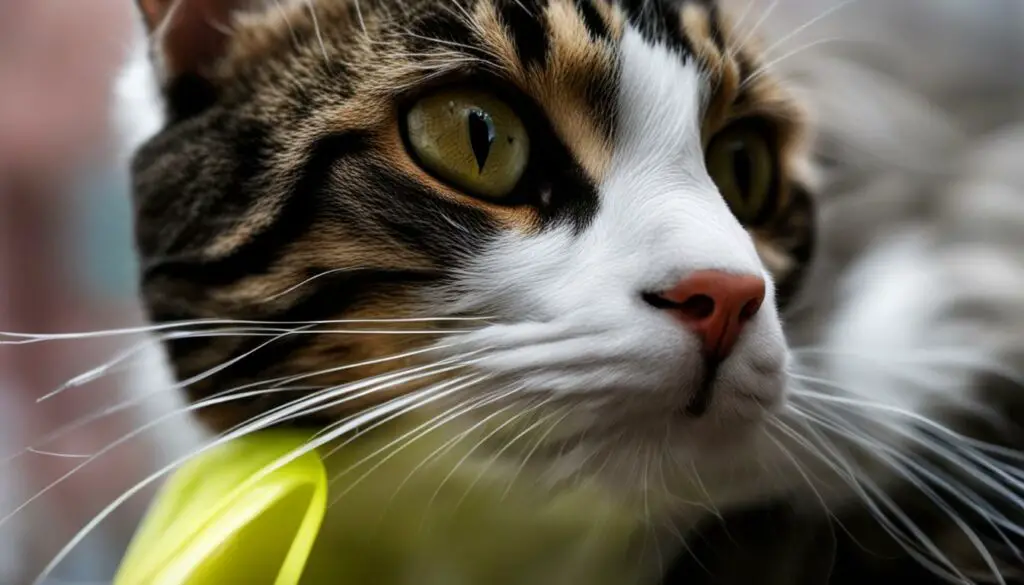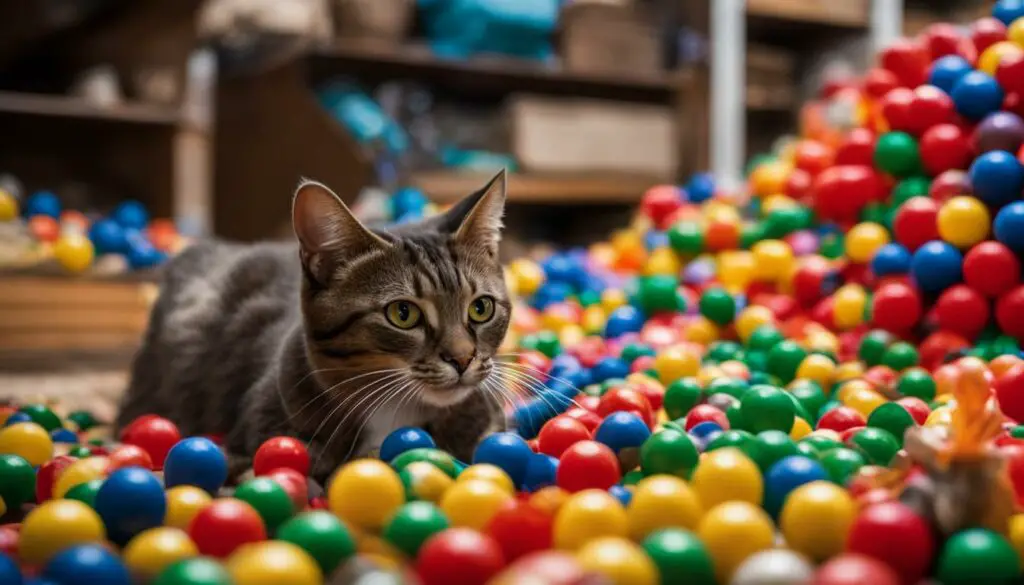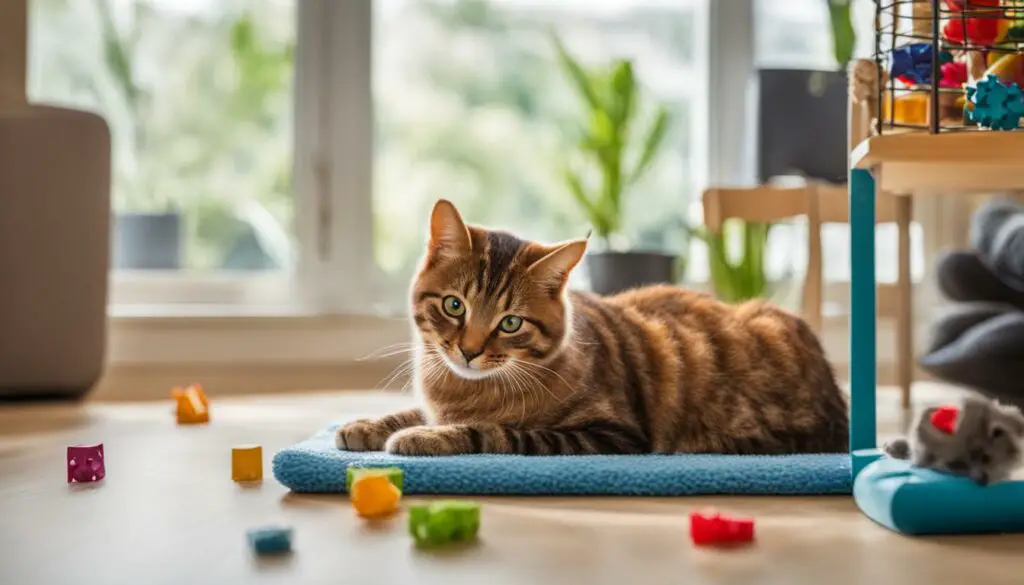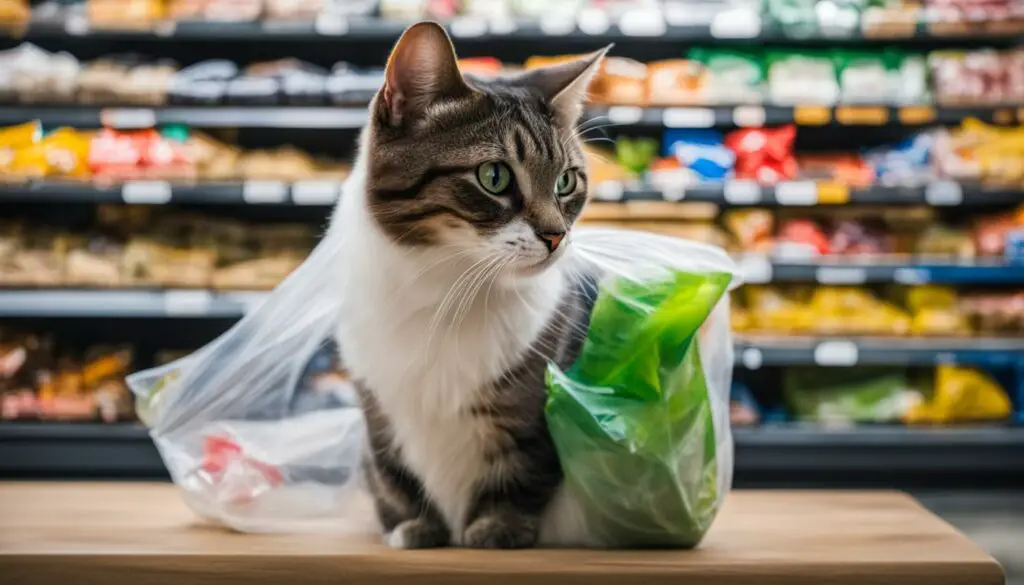Greetings, fellow cat lovers! Have you ever wondered why your feline friend has a strange fascination with licking plastic bags? Well, you’re not alone! This peculiar behavior is quite common among our curious kitties. Let’s dive into the fascinating world of feline behavior and explore the reasons behind this puzzling phenomenon.
Cats are known for their inquisitive nature, and their exploration often extends to licking objects, including plastic bags. It’s a way for them to satisfy their curiosity and investigate different textures and tastes. The crinkly sound and feel of plastic can mimic the movements of small prey, triggering their natural hunting instincts. Plus, the lingering scent of food or intriguing smells trapped in the plastic can be irresistible to our curious companions.
While it may seem harmless, there are potential health risks associated with this behavior. Plastic bags can contain toxic chemicals, and ingesting plastic can lead to choking, digestive issues, and other complications. Moreover, there is a risk of suffocation if a cat becomes entangled in a plastic bag.
In some cases, licking plastic bags may also be a sign of underlying psychological factors such as anxiety, stress, or boredom. It’s essential to address these issues to prevent excessive or compulsive licking behavior.
The good news is that there are ways to redirect their attention and discourage this behavior! Providing alternative toys, engaging them in interactive play, and creating a mentally stimulating environment can help alleviate boredom and reduce their desire to lick plastic bags. It’s also crucial to ensure their safety by storing bags in secure containers and keeping them out of reach.
If your cat’s licking behavior becomes excessive or is accompanied by other health issues, it’s always best to consult with a veterinarian for proper guidance and advice.
Key Takeaways:
- Cats often lick plastic bags out of curiosity and to explore different textures and tastes.
- Plastic bags can mimic the movements of small prey, triggering a cat’s natural hunting instincts.
- There are potential health risks associated with this behavior, including ingestion of toxic chemicals and the risk of suffocation.
- Licking plastic bags can sometimes be a sign of underlying psychological factors such as anxiety, stress, or boredom.
- Redirecting their behavior through alternative toys, interactive play, and creating a mentally stimulating environment can help address this behavior.
Understanding Feline Behavior
When it comes to feline behavior, cats are known for their curious and exploratory nature. This innate curiosity often leads them to engage in various behaviors, including licking objects such as plastic bags. While it may seem unusual to us, licking plastic bags is a way for cats to satisfy their curiosity and explore different textures and tastes.
Cats have highly sensitive senses, and the crinkly sound and texture of plastic bags can mimic the movements of small prey, triggering their natural hunting instincts. Additionally, the scent of food or other interesting smells trapped in plastic can attract cats to lick or chew on them. It’s important to note that not all cats engage in this behavior, but for those that do, it’s simply a part of their unique feline nature.
Why Do Cats Lick Plastic Bags?
One possible explanation for this behavior is that cats find the texture of plastic bags intriguing. The smooth and glossy surface of the bags, combined with the crinkly sound they make, can be highly stimulating to a cat’s senses. It’s also possible that cats find the taste of plastic intriguing, although this might vary from cat to cat.
Another reason why cats may lick plastic bags is that they are attracted to the scents trapped in the material. Plastic bags often come into contact with various odors, such as food or other interesting smells, and cats have a keen sense of smell that allows them to detect these scents. Licking the bags can be a way for cats to further investigate and explore these fascinating scents.

It’s important to note that while licking plastic bags may be a harmless behavior for some cats, it can pose certain risks. Plastic bags can contain toxic chemicals, and ingesting plastic can lead to choking, digestive issues, and other medical complications. Additionally, there’s a risk of suffocation if a cat becomes entangled in a plastic bag. Therefore, it’s essential to take precautions and prevent your cat from accessing plastic bags to ensure their safety and well-being.
The Sensory Appeal of Plastic Bags
Plastic bags have a unique sensory appeal to cats. The crinkly sound and texture of plastic can mimic the movements of small prey, triggering a cat’s natural hunting instincts. Additionally, the scent of food or other interesting smells trapped in plastic can attract cats to lick or chew on them.
When a cat hears the familiar sound of a plastic bag crinkling, it may instinctively associate it with the presence of potential prey. This sound can capture their attention and pique their curiosity, prompting them to explore further by licking or chewing on the bag. The combination of the crinkly texture and enticing scents can make plastic bags irresistible to our feline friends.
It’s important to note that cats have a highly developed sense of taste. The taste of plastic may be intriguing to them, as it can be quite different from their usual food or treats. While humans may find the taste unpleasant, cats may experience it as an intriguing and unique sensation.
Understanding the sensory appeal of plastic bags to cats can help us better comprehend their behavior. By providing alternative toys and activities that stimulate their senses in a similar way, we can redirect their attention away from plastic bags and ensure their safety and well-being.
| Sensory Appeal of Plastic Bags | Description |
|---|---|
| Crinkly Sound | The crinkling noise produced by plastic bags can mimic the movements of small prey, triggering a cat’s hunting instincts. |
| Texture | Cats are drawn to the unique texture of plastic bags, finding it interesting to lick or chew on. |
| Scent | The scent of food or other intriguing smells trapped in plastic can attract cats, making them want to investigate further. |
| Taste | Cats have a highly developed sense of taste, and the taste of plastic may be intriguing and different to them. |

Potential Health Risks
While cats may enjoy licking plastic bags, it is important to be aware of the potential health risks associated with this behavior. Plastic bags can contain toxic chemicals, posing a danger to your feline friend if ingested. These chemicals can lead to digestive issues, including upset stomach, vomiting, and diarrhea. Additionally, cats can also suffer from choking if they accidentally swallow a piece of plastic.
Another significant risk is the possibility of suffocation. Cats are curious creatures and may accidentally get their heads trapped in the bag while exploring or playing. This can restrict their breathing and lead to a life-threatening situation. It is essential to keep plastic bags out of your cat’s reach and store them in secure containers to prevent such accidents.
Toxicity and suffocation are serious concerns when it comes to cats and plastic bags. Therefore, it is crucial to take safety measures to protect your furry companion. Avoid leaving plastic bags unattended, especially if they contain food or other enticing scents. Opt for alternative storage options, such as reusable bags or containers, that eliminate the risk of exposure to harmful chemicals and reduce the chances of suffocation.
| Health Risks | Safety Measures |
|---|---|
| 1. Ingesting toxic chemicals | 1. Store plastic bags in secure containers |
| 2. Choking on plastic | 2. Avoid leaving plastic bags unattended |
| 3. Suffocation | 3. Opt for alternative storage options |
By taking these precautions and being mindful of the potential health risks, you can ensure the safety and well-being of your beloved cat. If you suspect your cat has ingested plastic or is experiencing any health issues related to plastic bag licking, it is crucial to seek veterinary guidance promptly. A veterinarian can provide a proper diagnosis and recommend appropriate treatment or management strategies to address any potential complications.
Underlying Psychological Factors
When it comes to cats licking plastic bags, there are often underlying psychological factors at play. Cats may engage in this behavior as a means of seeking attention or coping with feelings of anxiety, stress, or boredom. Understanding and addressing these underlying factors is essential for maintaining your cat’s overall well-being.
Cats are highly social animals, and they rely on social interaction and stimulation to thrive. In some cases, licking plastic bags may be a manifestation of their need for attention. By engaging in this behavior, cats may be trying to communicate their desire for interaction and engagement from their owners or other household members.
Anxiety, stress, and boredom can also contribute to cats licking plastic bags. These emotions can arise from a variety of sources, including changes in their environment, separation anxiety when left alone, or a lack of mental and physical stimulation. Licking objects, such as plastic bags, can provide a temporary distraction or outlet for these emotions.
To address these underlying psychological factors, it is important to provide your cat with an enriched and stimulating environment. This can include interactive toys, puzzle feeders, and regular play sessions to keep them mentally and physically engaged. Additionally, providing a safe and secure space where they feel comfortable and can retreat to when they need a break can help alleviate feelings of anxiety and stress.
| Psychological Factors | How to Address |
|---|---|
| Attention-seeking behavior | Engage in interactive play and provide regular attention and affection. |
| Anxiety | Create a calm and secure environment, provide hiding spots, and use pheromone diffusers if necessary. |
| Stress | Identify and address potential stressors, provide a consistent routine, and offer stress-reducing activities like gentle grooming or massage. |
| Boredom | Provide toys, scratching posts, and environmental enrichment to keep your cat mentally and physically stimulated. |
By addressing these underlying psychological factors, you can help redirect your cat’s behavior away from licking plastic bags and promote a healthier and more balanced lifestyle for your feline friend.

“Understanding and addressing the underlying psychological factors behind cats licking plastic bags is crucial for their overall well-being and happiness.” – Dr. Emily Thompson, DVM
Pica and Obsessive-Compulsive Disorders
Cats with pica, an eating disorder characterized by the consumption of non-food items, may be more prone to licking plastic bags. Pica can be a result of various factors, including nutritional deficiencies, anxiety, boredom, or even genetic predisposition. It is essential to address pica and any underlying compulsive behaviors in cats to ensure their well-being.
Environmental enrichment plays a crucial role in managing pica and obsessive-compulsive disorders in cats. Providing a stimulating and engaging environment can help redirect their focus and reduce the desire to engage in abnormal licking behaviors. Interactive toys, scratching posts, puzzle feeders, and regular playtime can provide mental and physical stimulation that can alleviate boredom and anxiety.
In severe cases, medication may be prescribed by a veterinarian to manage compulsive behaviors in cats. However, it is important to note that medication should always be used in combination with environmental enrichment and behavioral modification techniques.
| Benefits of Environmental Enrichment for Cats with Pica and Obsessive-Compulsive Disorders |
|---|
|
Quote:
“Providing a stimulating and enriching environment is crucial for cats with pica and obsessive-compulsive disorders. By offering a variety of toys and activities, we can help redirect their energy and promote a healthier, more balanced behavior.” – Dr. Sarah Johnson, Feline Behavior Specialist
Remember, managing pica and obsessive-compulsive disorders in cats requires patience, consistency, and a holistic approach. By addressing their underlying needs and providing appropriate environmental enrichment, we can help cats lead happier and more fulfilling lives.

Redirecting Behavior and Training
To discourage cats from licking plastic bags, it is important to provide alternative options and redirect their behavior. Training techniques and the use of deterrents can be effective in deterring this behavior and redirecting their attention elsewhere. Here are some strategies to consider:
1. Provide Alternative Toys and Entertainment
Engaging cats in interactive play and providing them with toys that stimulate their natural instincts can help divert their attention away from plastic bags. Consider using puzzle feeders, treat-dispensing toys, or interactive play wands to keep your cat mentally and physically stimulated.
2. Use Deterrents
There are various deterrents available that can help discourage cats from approaching plastic bags. These can include odor repellents, such as citrus sprays or vinegar solutions, or physical barriers, such as sticky tape or aluminum foil, placed near the bags. However, it is important to ensure that these deterrents are safe and do not cause any harm or distress to your cat.
3. Implement Positive Reinforcement
Positive reinforcement techniques can be employed to reward your cat for desirable behavior and redirect their attention away from plastic bags. When your cat engages with alternative toys or shows disinterest in the bags, provide praise, treats, or affection to reinforce the desired behavior. This helps create positive associations and encourages them to repeat the behavior.
Remember, consistency is key when redirecting behavior and training your cat. It may take time and patience for them to fully understand and adopt new behaviors. If you are struggling to manage your cat’s licking behavior, consulting with a professional animal behaviorist or veterinarian can provide you with expert guidance tailored to your cat’s specific needs.
| Deterrent Techniques | Effectiveness |
|---|---|
| Odor repellents (citrus sprays, vinegar solutions) | Can be effective for some cats, but not all |
| Physical barriers (sticky tape, aluminum foil) | May deter some cats, but others may find workarounds |
| Positive reinforcement | Can be highly effective when used consistently and appropriately |
Mental Stimulation and Relaxation
Cats, like any other animals, require mental stimulation to keep their minds sharp and engaged. Without adequate mental stimulation, cats can become bored, which may lead to behavioral issues and a decrease in overall well-being. Engaging your cat in activities that provide mental stimulation and promote relaxation is essential for their mental and emotional health.
One way to provide mental stimulation for your cat is through interactive play. Using toys that mimic prey and encourage your cat’s natural predatory behavior can provide both mental and physical exercise. This type of play allows your cat to tap into their natural instincts, keeping them mentally engaged and satisfied.
Another way to promote mental stimulation is through puzzle feeders. These interactive toys encourage cats to work for their food, providing mental stimulation and a sense of accomplishment. These puzzle feeders can be filled with treats or kibble, challenging your cat to figure out how to retrieve their reward.
The Benefits of Calming Environments
Creating a calm and secure environment for your cat is also crucial for their mental well-being. Cats are sensitive creatures that thrive in a stress-free environment. Providing hiding spots, cozy beds, and comfortable perches allows your cat to feel safe and secure.
Calming scents, such as lavender or chamomile, can also contribute to a relaxed environment. These scents can be incorporated through diffusers or sprays and can have a soothing effect on your cat’s overall mood.
By prioritizing mental stimulation and creating a calming environment, you can help alleviate boredom, reduce anxiety, and promote relaxation for your cat. This will not only enhance their quality of life but also strengthen the bond you share with your feline companion.

Social Bonding and Communication
Cats are unique creatures that use various behaviors to communicate and form social bonds with their owners and other animals. Licking plastic bags is one such behavior that serves as a form of communication and social bonding.
When a cat licks a plastic bag, it is a way of marking their territory and leaving behind their scent. This behavior helps them establish familiarity and create a sense of comfort in their environment. It also serves as a way for cats to communicate their affection towards their owners or other animals, as licking is often associated with grooming and showing care.
Furthermore, the act of licking plastic bags can reinforce positive associations for cats. If a plastic bag has been in contact with a familiar scent or has been used in a positive context (such as carrying treats or toys), cats may lick it as a way of seeking pleasure and experiencing those positive emotions again.
In summary, when cats lick plastic bags, it serves as a form of territorial marking, communication, social bonding, and reinforcement of positive associations. Understanding these aspects of feline behavior can help cat owners better interpret their cat’s actions and strengthen the bond between them.
Safety Measures and Precautions
When it comes to your cat’s well-being, safety should always be a top priority. Licking plastic bags may seem like a harmless behavior, but it can pose several risks to your furry friend. To ensure their safety, it is important to take certain precautions and prevent their access to plastic bags.
Toxic Chemicals: Plastic bags can contain toxic chemicals that are harmful to cats if ingested. These chemicals can lead to digestive issues and other medical complications. To protect your cat, store plastic bags in secure containers or cabinets that are out of their reach.
Suffocation: Cats can accidentally become entangled in plastic bags, which poses a suffocation risk. Always dispose of plastic bags properly and avoid leaving them within your cat’s reach. Providing alternative toys and environmental enrichment can redirect their attention and reduce the desire to play with plastic bags.
By implementing these safety measures, you can help ensure that your cat stays safe and secure. Remember, it is always better to be proactive and prevent potential hazards than to deal with the consequences later.
| Safety Tips | Explanation |
|---|---|
| Store plastic bags | Keep plastic bags in secure containers or cabinets that are out of your cat’s reach. |
| Dispose of properly | Always dispose of plastic bags properly to prevent your cat from accessing them. |
| Provide alternative toys | Offer your cat a variety of toys and interactive play options to divert their attention from plastic bags. |
| Environmental enrichment | Create a stimulating environment with scratching posts, climbing trees, and other enriching activities to keep your cat engaged. |
Remember, investing in your cat’s safety today can prevent unnecessary accidents and health issues in the future. If you have any concerns or notice unusual behavior, it is always advisable to consult with a veterinarian for further guidance and advice.
When to Seek Veterinary Guidance
If you notice that your cat’s licking behavior becomes excessive, compulsive, or is accompanied by other medical issues such as dental disease or gastrointestinal problems, it is crucial to consult with a veterinarian. They are trained to identify and address potential underlying health concerns and provide appropriate treatment or management strategies.
Excessive licking can sometimes be a sign of an underlying medical issue that requires professional attention. Dental disease, for example, can cause oral discomfort, leading cats to lick objects, including plastic bags, in an attempt to alleviate the pain. Gastrointestinal issues, such as inflammatory bowel disease or intestinal parasites, can also trigger abnormal licking behavior.
By seeking veterinary guidance, you can ensure that your cat receives the necessary care and treatment. Based on a thorough examination, your veterinarian can diagnose any medical conditions and develop a tailored plan to address your cat’s specific needs. This may involve dental treatment, dietary changes, medication, or other interventions to help improve your cat’s overall well-being.
Remember, your veterinarian is the best source of information and guidance when it comes to your cat’s health. If you have any concerns about your cat’s licking behavior or accompanying medical issues, reach out to your veterinarian for advice and support.
| Medical Issues Related to Licking Behavior | Signs and Symptoms | Treatment and Management |
|---|---|---|
| Dental Disease | – Bad breath – Difficulty chewing – Excessive drooling – Red or swollen gums |
– Dental cleaning and treatment – Antibiotics if there is an infection – Pain management medications |
| Gastrointestinal Issues | – Vomiting – Diarrhea – Lack of appetite – Weight loss |
– Diagnostic tests (such as blood work and stool analysis) – Medications to address inflammation – Prescription diets to support gastrointestinal health |
Conclusion
After exploring the fascinating behavior of cats licking plastic bags, it becomes clear that there are multiple factors at play. Understanding the reasons behind this behavior is crucial for ensuring the well-being of our feline companions. By addressing psychological factors, providing training and mental stimulation, and promoting social bonding, we can help redirect their attention away from plastic bags.
However, it is important to be aware of the health risks associated with this behavior. Plastic bags can contain toxic chemicals, and ingestion can lead to choking and digestive issues. Taking safety measures such as storing bags securely and providing appropriate alternatives is essential to keep our cats safe.
When in doubt or if the licking behavior becomes excessive, compulsive, or is accompanied by other health issues, it is always advisable to seek veterinary guidance. They can provide a proper diagnosis and recommend appropriate treatment or management strategies to ensure our cats’ overall well-being.
In conclusion, by understanding cats’ behavior, addressing psychological factors, providing appropriate alternatives, and ensuring their safety, we can create a harmonious environment for our feline friends. So the next time you wonder why do cats lick plastic bags, remember the importance of training, mental stimulation, social bonding, and veterinary guidance to keep them happy and healthy.
FAQ
Why do cats lick plastic bags?
Cats lick plastic bags for various reasons, including curiosity about different textures and tastes, the sensory appeal of the crinkly sound and movement that mimics prey, and the attraction to food or interesting smells trapped in the bags.
Are there any health risks associated with cats licking plastic bags?
Yes, there are potential health risks. Plastic bags can contain toxic chemicals, and ingesting plastic can lead to choking, digestive issues, and other medical complications. There is also a risk of suffocation if a cat becomes entangled in a plastic bag.
Can psychological factors contribute to a cat’s tendency to lick plastic bags?
Yes, cats may lick plastic bags as a way to seek attention or cope with underlying psychological issues such as anxiety, stress, or boredom.
How can pica and obsessive-compulsive disorders affect a cat’s behavior?
Cats with pica, an eating disorder characterized by the consumption of non-food items, may be more prone to licking plastic bags. Providing environmental enrichment and addressing any underlying anxiety or boredom can help manage these behavioral disorders.
How can I redirect my cat’s behavior away from licking plastic bags?
You can provide alternative toys, scratching posts, and interactive play to redirect their attention. Training techniques and the use of deterrents can also help discourage the behavior.
How can mental stimulation and relaxation techniques be beneficial for cats?
Engaging cats in mental stimulation through puzzle feeders, interactive play, and other activities can help alleviate boredom and reduce the desire to lick plastic bags. Creating a calm and secure environment that allows cats to express their natural instincts and engage in predatory behaviors can promote relaxation.
Is licking plastic bags a form of social bonding and communication for cats?
Yes, cats may use licking objects, including plastic, as a way to mark territory, show affection, seek comfort, and reinforce positive associations with familiar scents.
How can I ensure the safety of my cat concerning plastic bags?
To ensure your cat’s safety, store bags in secure containers, avoid leaving them within reach, and provide appropriate toys and environmental enrichment to divert their attention.
When should I consult a veterinarian regarding my cat’s licking behavior?
If your cat’s licking behavior becomes excessive, compulsive, or is accompanied by other health issues such as dental disease or gastrointestinal problems, it is crucial to consult with a veterinarian for proper diagnosis and treatment or management strategies.








